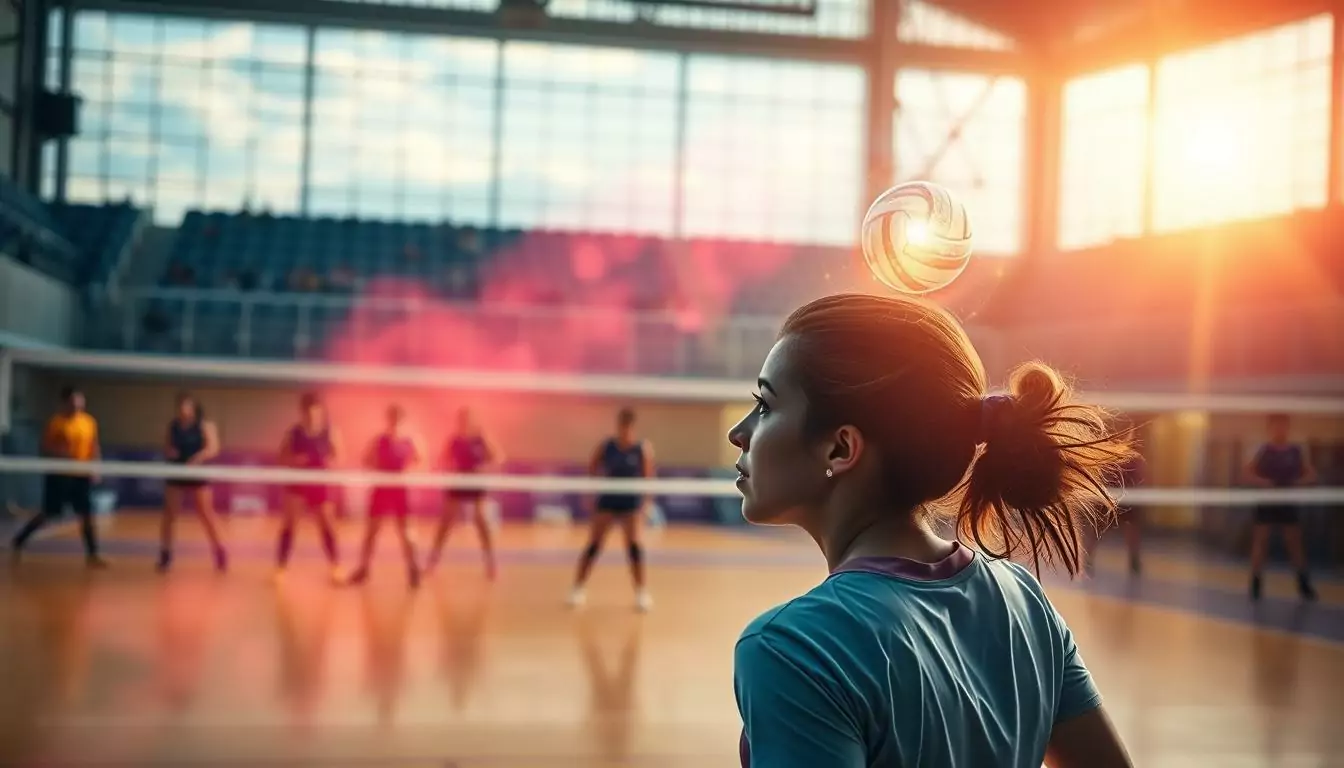As a volleyball fan, I’ve found that it’s not just about physical skills. It’s also about mental strength and emotional toughness. The best players use sports psychology to improve their game. In this guide, I’ll share mental preparation tips that have helped many players reach their peak.
Key Takeaways
- Understand the importance of sports psychology in volleyball performance
- Develop mental resilience and a strong mindset to overcome adversity
- Learn visualization techniques and pre-match routines for optimal preparation
- Discover strategies to maintain focus and concentration during games
- Harness the power of positive self-talk and goal-setting for sustained motivation
Understanding the Importance of Sports Psychology in Volleyball
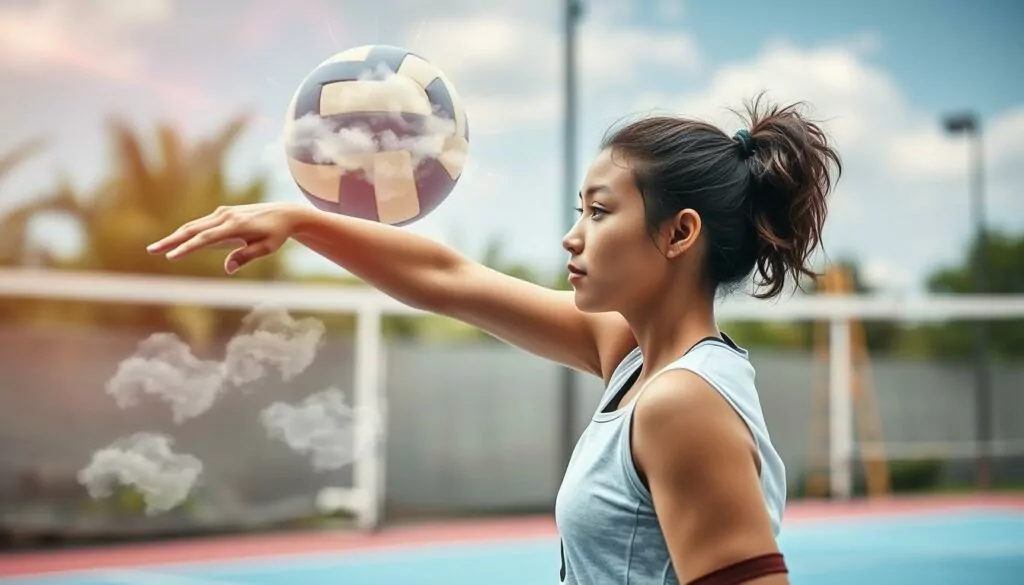
As a volleyball player, I’ve learned that the mental game is key to our success. Sports psychology studies how our minds affect our athletic performance. It greatly impacts volleyball.
What Is Sports Psychology?
Sports psychology uses psychology to help athletes improve their mental skills. It includes goal setting, building confidence, managing stress, and working well with teammates.
Why It Matters in Volleyball Performance
In volleyball, the mental aspect is as vital as the physical. Being able to stay focused, handle anxiety, and stay mentally strong can win games. Studies show that mental toughness boosts performance by 32% under pressure.
Goal setting and visualization can also improve skills by 26% and 22%, respectively. Good communication, stress management, and emotional control are also essential. Teams with strong communication skills see a 40% drop in conflicts. Players who manage stress well see an 78% boost in performance.
Understanding sports psychology helps volleyball players improve their mental game. It aids in managing anxiety, boosting focus, and building resilience. These skills can be a game-changer for any player.
“The mental game makes up 10% of sports, but it can elevate your overall game performance to 100%.” – Volleyball Player
Mental Resilience: Building a Strong Mindset
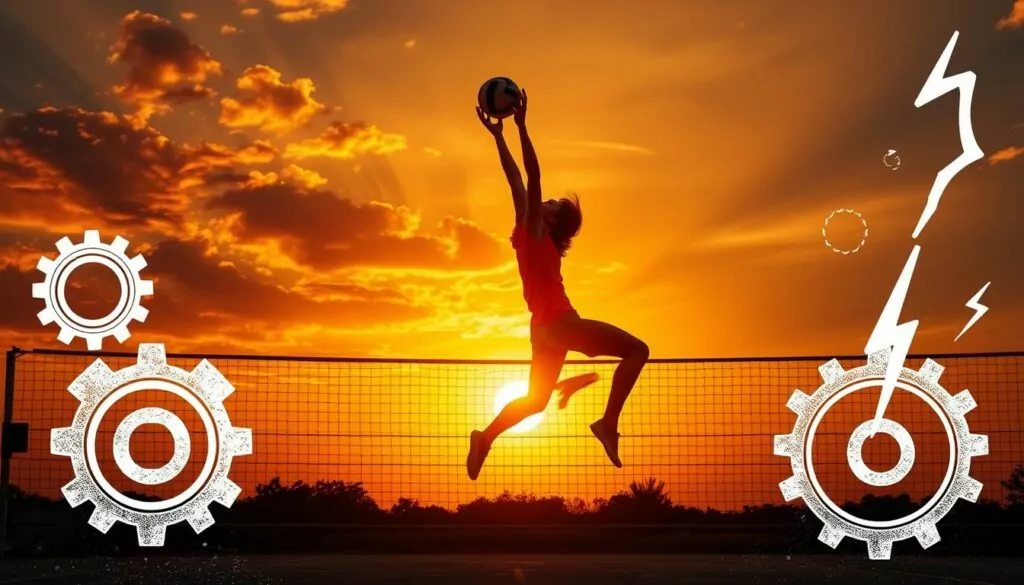
As a volleyball player, mental toughness is key to overcoming setbacks and challenges. A strong mindset helps you recover from mistakes, stay confident, and perform well under pressure.
Overcoming Adversity on the Court
Volleyball is full of errors, even for the best players. The real test is how you react to mistakes. Can you stay focused and confident, or do errors shake you?
Being able to stay calm and trust yourself is vital. It helps you navigate the ups and downs of a match.
Techniques to Strengthen Mental Toughness
- Positive self-talk: Use positive, empowering words to boost your confidence. Remember your strengths and past wins.
- Visualization: Imagine yourself playing well and overcoming obstacles. See yourself winning.
- Goal-setting: Set clear, reachable goals to guide you. Celebrate your progress.
Building mental resilience is a journey with big rewards. A strong mindset prepares you for volleyball’s demands. You’ll perform at your best, no matter the challenges.
“Resilience is not about being unbreakable. It’s about having the strength to put the pieces back together again and again.”
Pre-Match Mental Preparation
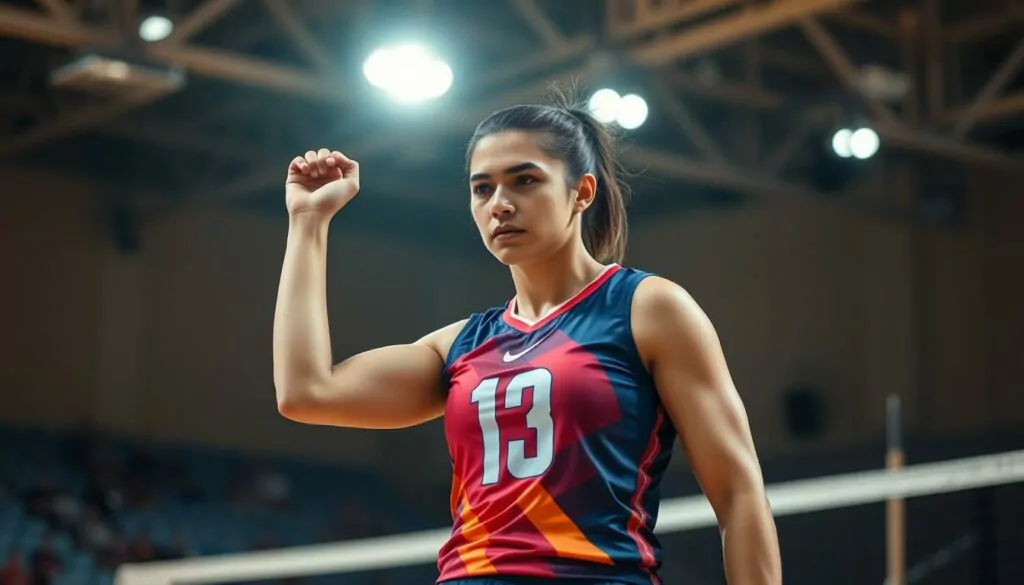
As a volleyball player, I’ve learned that mental preparation is just as important as physical training. Before a big match, I focus on two key areas. These are visualization techniques and establishing a consistent pre-match routine.
Visualization Techniques for Success
Visualization is a powerful tool for me. It lets me picture myself making successful plays and achieving my goals on the court. I close my eyes and vividly imagine serving the ball with precision, making clean passes, and scoring points for my team.
This mental rehearsal boosts my confidence and puts me in a positive mindset. It helps me feel ready and focused for the game.
Establishing a Pre-Match Routine
Having a reliable pre-match routine is essential for me. Consistency is key. By following the same sequence of activities before each game, I can enter a familiar, focused state of mind.
My routine includes listening to a curated playlist, doing my warm-up exercises, and positive self-talk. These activities help me get into game mode smoothly. They allow me to maintain my focus and perform at my best.
By visualizing success and relying on my routine, I can approach each match with confidence. I’m ready to tackle any challenge that comes my way.
“Consistency in everyday life and routine before and during a match is key for mental preparation,” says Kerri Walsh Jennings, a successful volleyball player.
Focus and Concentration: Keys to Performance
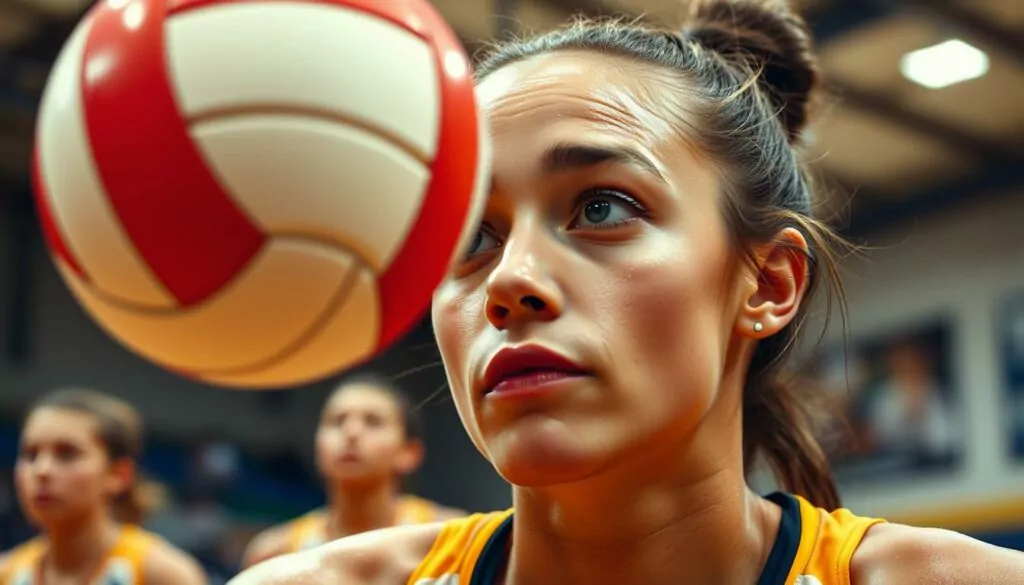
For volleyball players, staying focused and concentrated is key to winning. The court is full of distractions, like referees and teammates. These can really affect how well a player does.
To overcome these challenges, focus strategies and concentration techniques are vital. A high school player, even the best on the court, faced distractions that hurt her game. This shows how important mental skills are, along with physical ones.
Strategies for Maintaining Focus
Good volleyball players learn to stay focused despite distractions. They use several strategies:
- Deep breathing exercises to calm down
- Mindfulness to stay in the moment
- A pre-match routine to get mentally ready
Managing Distractions During Games
Handling distractions in a game is a skill. Athletes who can’t focus may find it hard to get back on track. By learning to ignore outside factors, players can keep their concentration and follow their game plan.
The Focused Athlete program helps players at all levels improve their mental game. It teaches them to focus better and manage distractions. With practice, athletes can perform more consistently and successfully.
“I’ve learned that focus is critical, even in high-pressure games like post-season matches. It’s about focusing on one point at a time and staying in the moment. That’s how I do my best.”
– Kenzie Maloney, University of Nebraska Senior
The Role of Self-Talk in Volleyball
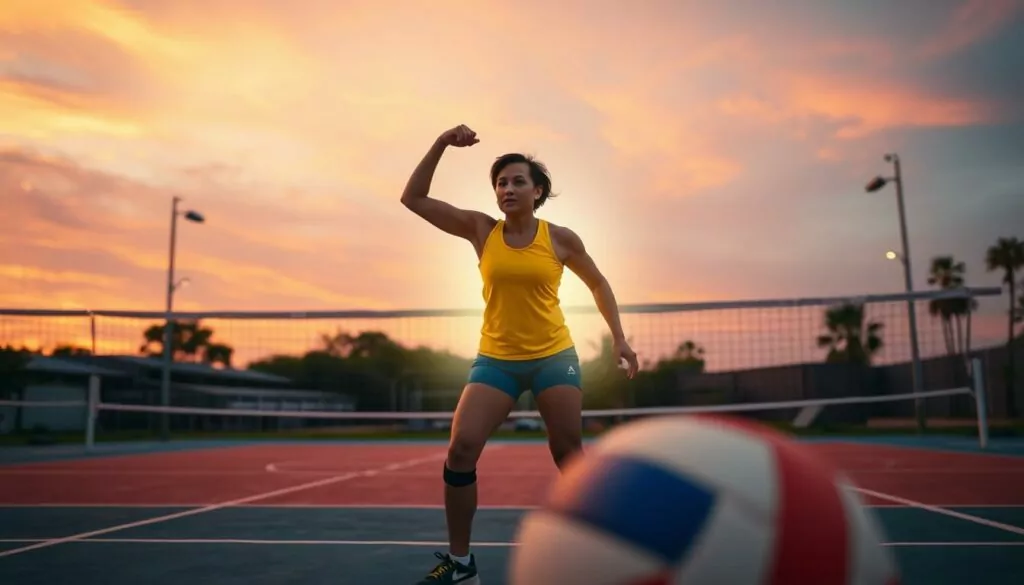
In volleyball, how we talk to ourselves matters a lot. Positive self-talk boosts our confidence and helps us deal with game pressure better. On the flip side, negative self-talk can hold us back and stop us from improving. By changing our inner dialogue, we can reach our full court performance.
Positive Affirmations for Athletes
Positive affirmations are key to changing our mindset. Saying things like “I am a skilled volleyball player” or “I can overcome any challenge” changes our brain’s beliefs. This confidence leads to better performance, making us more focused and resilient.
Make a list of affirmations that match your goals and experiences. Say these before practices and games. This helps your mental game by filling you with positive thoughts.
Transforming Negative Thoughts into Positive Actions
- Notice when you think negative thoughts, like “I’ll never be able to serve that jump serve.”
- Turn these thoughts into positive ones, like “I may not have it yet, but with practice, I can improve my jump serve.”
- Use encouraging words to motivate yourself, like “I can do this” or “I’m going to give it my best effort.”
- Imagine yourself doing well in skills or plays you struggle with. This builds a positive mindset.
By changing our negative thoughts into positive actions, we can improve our mindset. Remember, self-talk is powerful. With practice, we can master our mental game and succeed more on the court.
Goal Setting for Volleyball Players
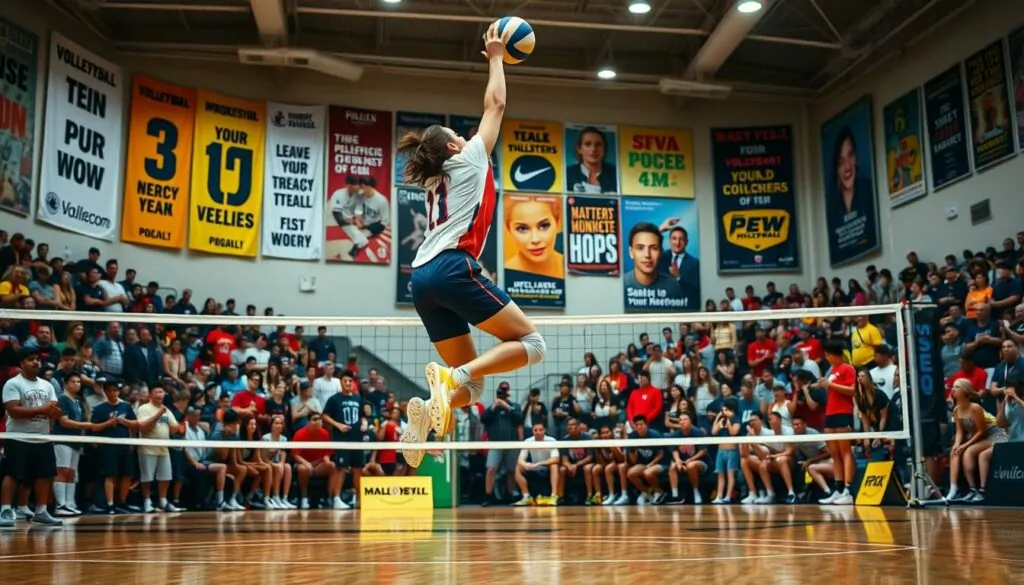
Setting goals is key for volleyball players to keep improving and reach their best. Goals guide, motivate, and map out success. Whether it’s better serving, jumping higher, or winning a championship, setting goals helps achieve these dreams.
Types of Goals: Short-term vs. Long-term
It’s vital to have both short-term and long-term goals. Short-term goals are about quick improvements, like boosting your spiking by 5% soon. Long-term goals set a bigger picture, like making the all-conference team or starting by season’s end.
SMART Goals: A Framework for Success
The SMART goal-setting framework is great for volleyball players. SMART means Specific, Measurable, Achievable, Relevant, and Time-bound. This helps set clear, trackable, and relevant goals for improvement. For instance, a SMART goal could be to increase your serve receive percentage to 90% by the end of the next tournament.
Keeping an eye on your progress towards SMART goals is key. It keeps you motivated and confident. This focus helps you work towards specific skills, physical traits, or mental aspects of your game.
By adopting a goal-setting mindset and using the SMART framework, you can map out your volleyball journey. This drives consistent improvement and helps you reach new heights in your game.
Team Dynamics and Communication
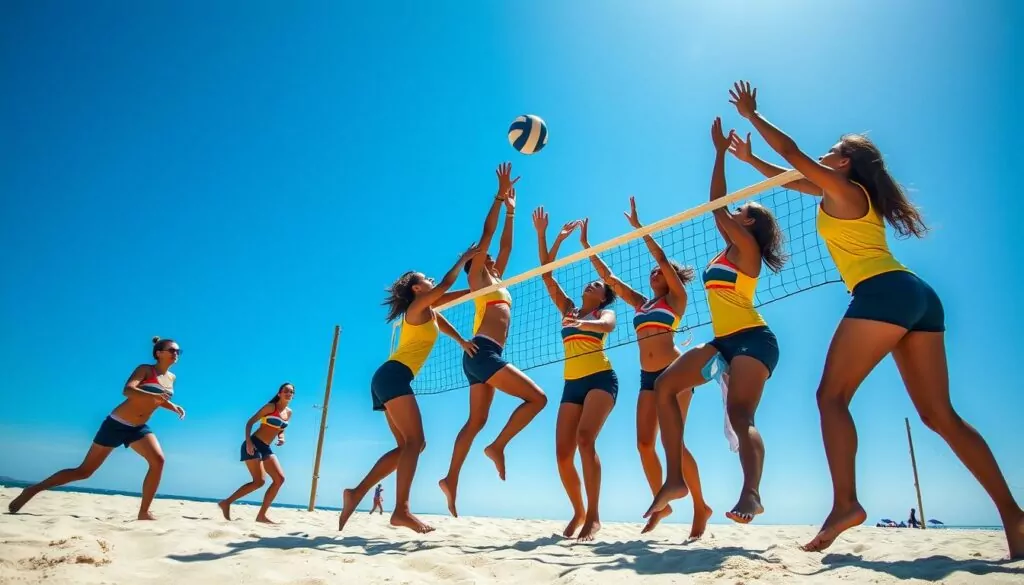
Successful volleyball teams rely on strong team dynamics and clear communication. When players work together, they build trust and improve their game. Understanding team cohesion and communication is key for any volleyball player.
Importance of Team Cohesion
Team cohesion is what keeps a volleyball team together. When players feel united, they support each other and work towards common goals. This unity is essential for success in volleyball.
Effective Communication Strategies on the Court
Good communication is the heart of team dynamics in volleyball. Clear calls and instructions are vital. Nonverbal cues like gestures also help in volleyball teamwork.
Eye contact is important for teamwork. It helps players anticipate each other’s moves. This anticipation leads to better team performance.
Communication in volleyball also relies on team intuition. When players trust each other, they can anticipate and react quickly. This teamwork boosts the team’s performance.
Good communication is more than just talking. It’s about listening and understanding each other. This way, volleyball teams can use their strengths and improve their weaknesses. This leads to a strong and effective team on the court.
| Volleyball Position | Responsibilities |
|---|---|
| Receivers | Mastering serving techniques and initiating the play |
| Attacking Players | Possessing various attacking techniques to score points |
| Defensive Players | Excelling in blocking and defensive passing to prevent opponents from scoring |
| Setters | Responsible for accurate setting and quick decision-making to orchestrate the offense |
By focusing on team dynamics and communication, volleyball teams can reach their full strength. When players are in sync, they can execute strategies and perform well under pressure.
Managing Anxiety and Stress

As a volleyball player, it’s key to manage anxiety and stress well. Sports psychology looks into how these feelings affect athletes. High-level sports can cause a lot of anxiety, which can change how athletes perform.
Techniques to Calm Pre-Game Nerves
Progressive muscle relaxation is a good way to calm down before games. It involves tensing and relaxing muscles to ease tension and calm the mind. Positive visualization is also helpful. It’s about imagining yourself playing well and feeling confident.
Breathing Exercises for Stress Relief
- Deep diaphragmatic breathing is great for reducing stress and relaxing. Breathe in deeply through your nose, hold, then breathe out slowly through your mouth.
- Box breathing is another good option. Breathe in for four counts, hold for four, breathe out for four, and hold again for four. It helps calm your mind and body.
- Adding these breathing exercises to your pre-game routine can help manage anxiety management and stress relief. This way, you can perform better on the court.
Learning to calm pre-game nerves and using breathing exercises can improve your mental game. This will help you play your best volleyball.
The Power of Routine
As a passionate volleyball player, I’ve found that a consistent routine boosts my game. Routines give me a sense of control and help me mentally prepare for games. They improve my focus and performance, making me a better player.
Unlocking the Benefits of Routine
Routines help me feel less nervous before games. By doing familiar actions, I calm down and focus. This lets me use my skills and strategies better.
My routine also gets me ready to perform. It could be warm-ups, music, or visualizing success. These rituals prepare me to play my best.
Crafting Effective Pre-Game Rituals
- Warm-up Routine: I start with a dynamic warm-up, focusing on essential volleyball movements like jumping, reaching, and lateral agility drills.
- Mental Preparation: I take 5-10 minutes to visualize myself executing successful plays, feeling confident and in control on the court.
- Affirmations: I recite a few positive affirmations to myself, reminding me of my abilities and the hard work I’ve put in to prepare for this moment.
- Team Bonding: My teammates and I share a pre-game handshake or high-five, fostering a sense of camaraderie and unity.
By sticking to a routine, I’ve become mentally and physically stronger. These pre-game routines have greatly improved my performance enhancement and volleyball rituals.
“A well-crafted routine can be the difference between a good game and a great one. It’s about finding what works for you and sticking to it with unwavering discipline.”
Developing Emotional Intelligence
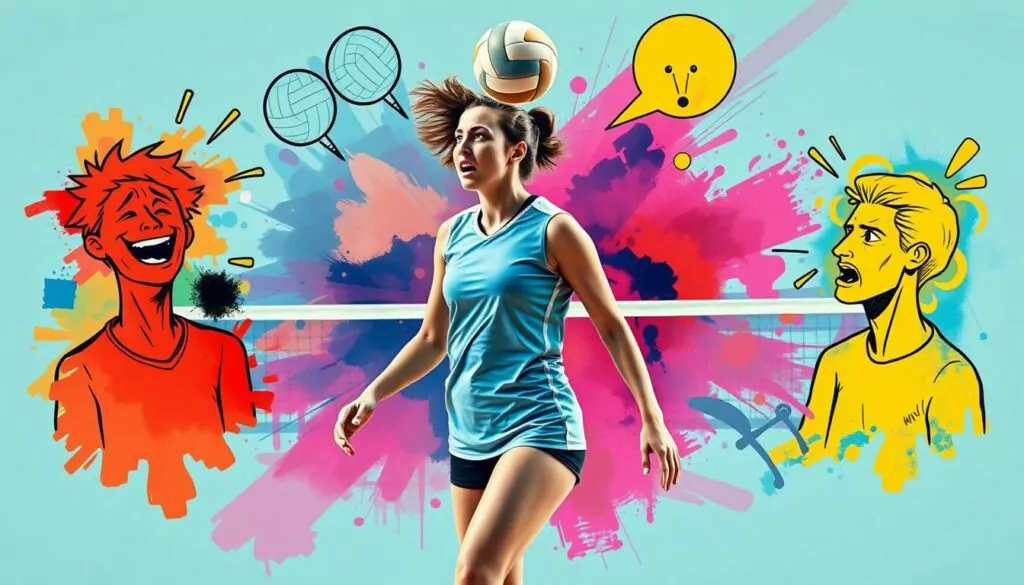
As a volleyball player, it’s key to have emotional intelligence. This helps keep us calm and focused on the court. By knowing our own feelings and those of our teammates, we can build strong team bonds. This creates a supportive environment that helps us reach our goals together.
Understanding My Emotions as an Athlete
My emotions can really affect how I play. Feeling anxious or stressed can mess with my focus and decisions. By recognizing and managing my emotions, I can improve my game.
Using mindfulness and self-reflection helps me understand my feelings better. This way, I can find ways to handle them.
Empathy: Strengthening Team Relationships
Empathy is important for team relationships. It lets me understand and share my teammates’ feelings. This makes communication better and builds trust.
By being empathetic, we can work together better. This leads to better performance and a more fun experience for everyone.
| Emotional Intelligence Variable | Female Volleyball Players | Male Volleyball Players |
|---|---|---|
| Emotional Appraisal | 4.7 | 4.2 |
| Emphatic Sensitivity | 4.8 | 4.4 |
| Positive Utilization | 4.6 | 4.1 |
| Respect for Social Conventions | 4.5 | 4.0 |
| Respect for Rules and Officials | 4.7 | 4.3 |
| Respect for Full Commitment | 4.8 | 4.4 |
The study shows female volleyball players have higher emotional intelligence. This is true for both genders. Emotional intelligence is key for better team work and performance.
“Emotional intelligence is the ability to recognize, understand, manage, and reason with emotions. It is a critical skill for volleyball players to develop, as it helps us navigate the high-pressure situations and complex team dynamics inherent in the sport.” – Dr. Sarah Thompson, Sports Psychologist
Mindfulness and Meditation in Sports
Volleyball players always look for ways to improve their mental game. Mindfulness and meditation are great tools. They help us focus better, reduce stress, and think more clearly.
Benefits of Mindfulness for Volleyball Players
Studies show mindfulness helps athletes a lot. A study with 30 elite female Brazilian volleyball players showed it reduces mental fatigue. It doesn’t affect physical fatigue much.
Another study looked at 32 studies on mindfulness in sports. It found mindfulness improves athletes’ focus, awareness, and emotional control.
Simple Meditation Practices for Focus
- Focused Breathing: Before a game, breathe deeply. Inhale through your nose and exhale through your mouth. This calms your mind and improves focus.
- Body Scan: Scan your body from head to toe. Notice any feelings or tension. Relax each muscle group. This increases body awareness and relaxation.
- Mantra Meditation: Repeat a positive phrase, like “I am focused and present.” It helps keep your thoughts in check and keeps you calm.
Adding these meditation practices to your daily routine can make you mentally stronger. This helps you perform better on the volleyball court.
“Mindfulness is not about changing, fixing, or improving anything. It’s about arriving and being present with kindness and curiosity.” – Jon Kabat-Zinn
Starting mindfulness and meditation can change your game. It lets you play your best and enjoy the journey. As you keep practicing, you’ll get sharper and more resilient in volleyball.
Analyzing Performance: Reflection and Feedback
As a volleyball player, it’s key to regularly check how I’m doing and get feedback. Looking back at my games helps me see what I’m good at and what I need to work on. I think about my decisions, how I play, and how tough I am mentally.
Importance of Self-Assessment After Matches
Right after a game, I take time to think about how I did. I ask myself: What did I do well? What could I have done better? What strategies worked and what didn’t? This helps me know where to focus to get better.
- Identify areas for skill improvement
- Recognize mental and physical strengths
- Celebrate successes and learn from setbacks
- Enhance self-awareness and emotional intelligence
Seeking Constructive Feedback from Coaches
I also listen to what my coaches say. Their advice and outside view are super helpful. I like hearing both good things and things I can get better at. It helps me improve my game.
- Engage in open and honest dialogue with coaches
- Ask for specific feedback on technical, tactical, and mental aspects
- Collaborate with coaches to develop personalized action plans
- Express gratitude for the coach feedback and use it to fuel my growth
By reflecting on my game and listening to my coaches, I get better at volleyball. This way of thinking about my game is key to my success.
Maintaining Motivation Throughout the Season
Being a dedicated volleyball player can be tough, with a long and demanding season ahead. You might face setbacks or struggle to stay focused on your goals. It’s key to find ways to keep your passion and drive alive.
Finding Inspiration in Setbacks
Every volleyball player will hit some tough times during the season. Instead of getting down, see these challenges as chances to grow and get better. Russ Rose, the legendary head coach at Penn State University, is known for his ability to motivate players through even the toughest times. He teaches players to take charge of their own growth, even when it’s hard.
Strategies to Stay Committed to My Goals
- Set process-oriented goals: Focus on improving your skills and technique, not just winning or losing. This keeps you motivated, even when results aren’t what you hoped for.
- Celebrate small victories: Acknowledge and celebrate every small step forward. These small wins keep your motivation up and your spirits high.
- Regularly revisit your long-term aspirations: Keep your big dreams for the season in mind. Visualize achieving them and let that drive your daily efforts.
To stay motivated, focus on what you can control, like your preparation and commitment to getting better. Embrace a growth mindset and find inspiration in tough times. This way, you can stay driven and focused on your goals, no matter what challenges come your way.
The Influence of Coaches on Mental Game
As athletes, our mental game is key to our success on the volleyball court. Our coaches can either boost or block our mindset and experience. Research shows that a coach’s style greatly affects our mentality and our relationship with them.
How Coaches Shape Player Mentality
Studies find that the best coaching style is autonomy-supportive. This approach gives athletes freedom and support to improve on their own. It meets our psychological needs, leading to better performance and happiness.
On the other hand, authoritarian coaching can harm our autonomy and skills. It can make us less interested in playing volleyball.
Building a Supportive Coach-Athlete Relationship
A strong, respectful coach-athlete relationship is vital for our mental health and success. Open communication, trust, and teamwork are essential. They help us grow and perform better.
When coaches support our skills and let us take charge, we feel more motivated and satisfied. This leads to better results on the court.
